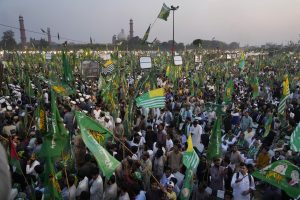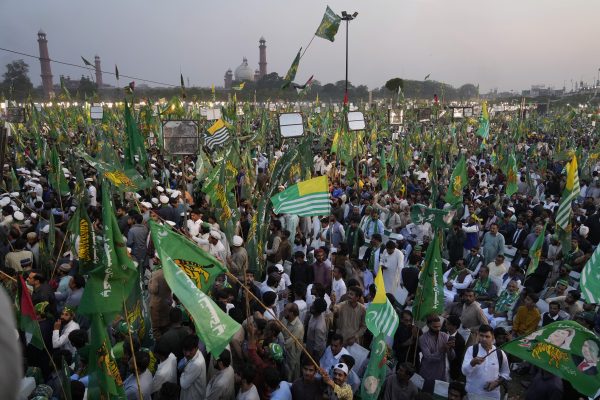Magazine
“Pakistan is facing a polycrisis and it is the convergence of political, economic, social, and security crises that makes the current situation so volatile.”

Supporters of Pakistan’s former Prime Minister Nawaz Sharif attend a welcoming rally for their leader in Lahore, Pakistan, Saturday, Oct. 21, 2023.
Credit: AP Photo/Anjum Naveed
Pakistan is at a crossroads. Elections are looming in early 2024, but the most popular politician in the country – Imran Khan – is in jail and few expect any true democratic choice at the polls. Meanwhile, the country’s economy is cratering, with poverty on the rise even as terrorist attacks become more frequent and more deadly.
The Diplomat interviewed Uzair Younus, the director of the Pakistan Initiative at the Atlantic Council’s South Asia Center and the vice president at The Asia Group, about Pakistan’s political atmosphere amid this looming economic and security crisis. The outlook is not promising.
“To find a way out of this polycrisis, Pakistan’s elites must call an end to the ongoing game of thrones that is forcing them to secure power in Islamabad and Lahore, whatever the costs,” Younus said.
Back in August, a caretaker government took the helm in Pakistan with Anwaar-ul-Haq Kakar, a Balochistan Awami Party senator, at its head. How has Kakar managed the government so far?
Diplomat Brief
Weekly Newsletter
Get briefed on the story of the week, and developing stories to watch across the Asia-Pacific.
Get the Newsletter
The caretaker government’s job is to ensure that free, fair, and timely elections are held in Pakistan. Elections have been delayed due to what I refer to as creative interpretations of the constitution – the Election Commission has said it cannot hold timely elections due to the constituency delimitation process – and efforts are being made to ensure that the Pakistan Tehreek-e-Insaf (PTI) does not have a level playing field. The PTI’s leader, Imran Khan, remains in jail, and while he is the most popular politician in the country, his party has continued to allege that its workers are facing harassment, intimidation, and arbitrary arrests. As a result, one has to say that Kakar’s caretaker government is actively failing in its constitutional duty.
Most in Pakistan recognize that free and fair elections are unlikely to be held in 2024. Many experts still believe that elections may actually be delayed further – their concerns have some validity given that the Election Commission has not announced dates at this point in time. There is a broad consensus that there will not be a level playing field in the upcoming elections and that the military establishment will play the role of kingmaker. As a result, confidence in Pakistan’s flawed and floundering democracy is at an all-time low. Should the economic crisis worsen, there is a real likelihood that this growing anger may lead to growing protests.
Another key trend to keep in mind is the impact of the growing political vacuum in Pakistani Punjab. Prior to the 2018 elections, the Tehreek-e-Labbaik Pakistan (TLP) emerged as a spoiler in the province, helping split the PML-N’s vote base. Over the last few months, the TLP has significantly grown its footprint in the province, capitalizing on the unpopularity of the PML-N and the lack of freedom enjoyed by the PTI. A recent poll conducted by Gallup Pakistan showed that Saad Rizvi, who leads the TLP, is the second-most popular leader in Pakistan. The TLP has been weaponizing the blasphemy issue and targeting Ahmadis across Pakistan in recent weeks as well, which has allowed the group to make further inroads in both Punjab and the city of Karachi.

